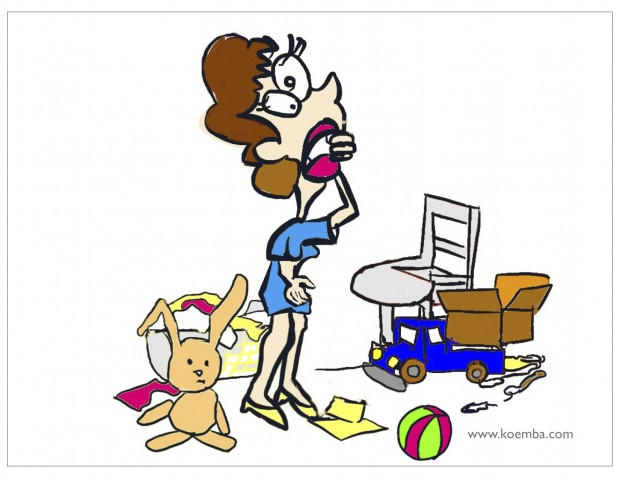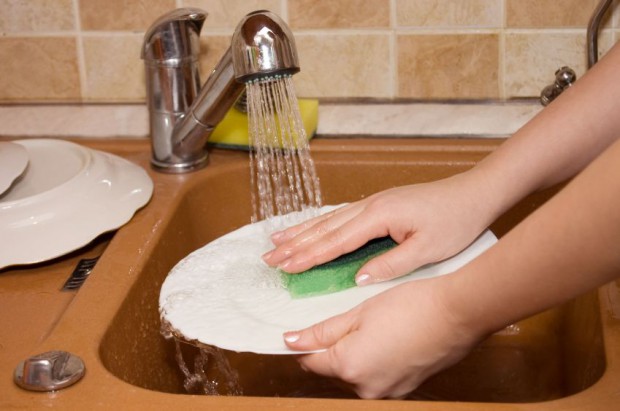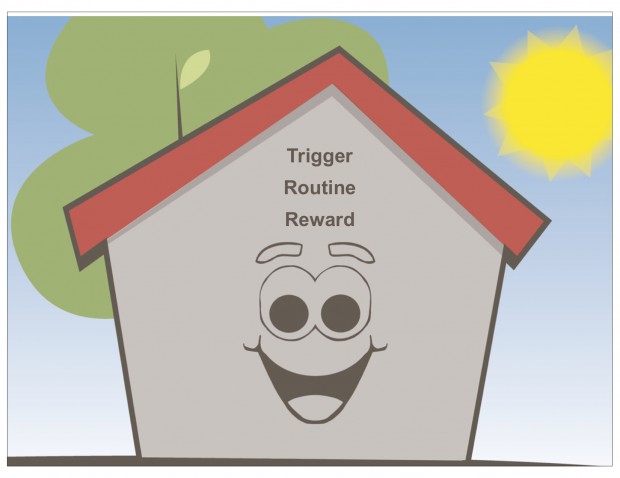Cindy was mortified. The Estate Agent hadn’t warned her he’d be bringing viewers to her house that afternoon. It was early afternoon when the doorbell rang. There he stood with the ‘perfectly happy’ couple hanging on each other’s arms and ready to peer into every room of her home. And all Cindy could think was, ‘I haven’t made the beds!’ 
We’ve probably all had those ‘Cindy moments’ when people get to see the side of our lives – the clutter, the chaos, the disorganisation – that we’d prefer others not to see. You might have googled, ‘How to have an organised home?’ but what’s your real reason for wanting that? Are you trying to impress the would-be house buyers, the visitors or to create the pleasant home you really want for your own family to enjoy? Because if the cost of a tidy home is constant nagging, the price is way too high. If you’re trying to do it all yourself, you’ll be frazzled, but how do you get kids to cooperate?
– How do we get out the door for school in the morning without upsets?
– How do I get my child to tidy up after himself?
– How do I get my child to help in the home?
So here’s the one thing you need to know to create a tidy and happy home: Help your children learn Habit.
Habit comes out tops over Motivation every time. Take for example, ‘I’d love to have a tidy house.’ I can look at magazine pictures of gorgeous homes, I can buy great new storage containers, I can read books on how to organise my personal space. But, unless I develop habits that support me to fulfill my motivation to have a tidy house, I’ll still be living with the clutter.
I’d love a tidy house and yet I tend to put the clothes I’ve worn that day on the chair next to my bed in the evening. Perhaps I imagine they’ll somehow magically transport themselves into the laundry bin or back into the cupboard during the hours I’m blissfully asleep – but of course, there they are still lying on the chair in the morning. Then I can get caught up with the new day and here I am at 11 am and yesterday’s clothes are still piled on the chair. My motivation is ‘tidy home’. I can dream of how it will be with everything neatly in place, but the bottom-line is that it’s the every day helpful habits I choose that will give me what I desire. It’s not Motivation that’s needed, its Habit.
‘Okay, habits are fine,’ you may be saying, ‘but I always end up being the one cleaning everything up. How do I get my kids to take responsibility?’
It’s still down to habit. Your child learns from you. And the best way to get cooperation is to involve them in helping from toddler stage when they want to help. It’s easy to do it all yourself when they’re young because you can do it so much quicker, but when they develop the habits, the habits stick.
Children learn what you model. Start from wherever you are now. Identify just one small area in the home where you’d really like to create a change. What mindful habit would help to make this a reality? Become consciously aware of that one habit you’d like to change or to develop. Habits are wired into our brain circuitry, so we don’t ‘stop habits’ – we replace them.
For instance, rather than thinking, ‘I mustn’t leave the dishes unwashed,’ I remind

myself I like to leave a ‘happy sink’ at night. (Think what you do want, not what you don’t.)
That means every dish needs to be washed, dried and put away, or packed in the dishwasher immediately after the meal. If you create the habit it soon sticks (and television doesn’t get switched on until we have a happy sink). The more we repeat the habit, the less mental energy we spend on it and the more automatic it becomes. Our chores become regular habits. If you think ‘chores’, like me you probably inwardly groan. But why can’t chores be a fun family time? A time to sing favourite songs, to catch up on the day, to tell silly jokes – whatever works for your family. It doesn’t need to be a choice between tidy house or pleasure. The idea of tidy house is for home to be more pleasurable. So create collaborative connection. But how?
I’ll chat about the three keys to successful habit, identified by Tara Bennet-Goleman in her brilliant book, ‘The Mind Whisperer’.
1. Identify the Trigger
Our brains run everyday routines automatically, so that we don’t have to waste energy thinking about them. When you’ve been to the loo you automatically reach for the loo paper. You don’t have to think about it. You’ve done it so many times that sitting on the loo seat triggers your habit of reaching for the toilet paper. So to get the family to develop helpful habits, establish the trigger from as early an age as possible. When I get up from the table I take my plate to the sink.
2. Establish the Routine
Habit is routine. We do the same thing each time. That’s how it gets established as automatic habit in our brain circuitry. Leave the dirty dishes on the table tonight and you’re weakening the habit. A habit is a habit is a habit. You need to stick to it if you want it to work for you. Establish the routine to establish the habit.
3. Give Reward
When we experience a reward, we’re more likely to want to repeat the behaviour, and that helps to establish the habit.You know how good it feels to leave the sink clean and shining – that’s the reward in itself. Notice how you feel when it’s looking good. Use phrases like ‘happy sink’ that give your child a picture to identify with, so they experience that inner satisfaction too. And hearing your satisfaction is also reward for your child. But beware – it’s easy to slip into giving treats as rewards. When we start this we’re heading down a slippery slope. You’ll end up in future years having to barter to get jobs done.
Hearing ‘Thank you’ is reward, but if you’re talking about household chores, avoid saying, ‘Thank you for helping me.’ It’s everyone’s home – it’s not about helping you, as though you alone are responsible for a tidy home. You’re not a servant. It’s about all cooperating together for everyone’s benefit.
Teach your children how to make habits stick – to give the routines we need – to keep the house pleasant – to have the connection and cooperation that creates happy family.
Help your child learn helpful habits by consistently using all three keys

– Trigger, Routine and Reward.
Experiment today.
What one habit will you choose to begin establishing today?
What’s the trigger?
What’s the routine you need to establish?
What’s the implicit reward you can all experience?
Please comment on this blog post. Let’s share what happens when you focus on habit to create the cooperation you need in the home.
‘The road in life forks at every moment, with one path leading toward confusion, separateness and entanglement, and the other toward clarity, connection, and mental freedom.’ Tara Bennet-Goleman


No comments yet.